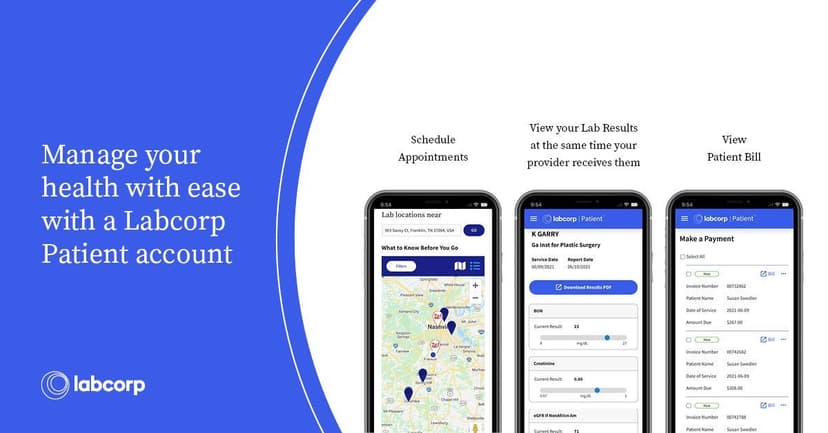Biomarkers in blood tests are changing the way we think about health care. They help doctors and patients understand health better and create personalized treatment plans. This article explores what biomarkers are, how they work, and their role in improving health outcomes for everyone.
Key Takeaways
- Biomarkers are specific indicators in the blood that help doctors understand a person's health.
- Using biomarkers can lead to personalized treatment plans that fit individual needs.
- Digital biomarkers, collected through devices like smartwatches, give real-time health data.
- Emerging technologies are making it easier to analyze biomarkers for better health insights.
- Ethical concerns around privacy and accuracy are important as biomarker testing becomes more common.
Understanding Biomarkers and Their Role in Personalized Health
Definition and Types of Biomarkers
Biomarkers are measurable indicators of biological processes, conditions, or responses to treatments. They can be found in various forms, including:
- Molecules (like proteins and lipids)
- Nucleic acids (such as DNA and RNA)
- Cells (like immune cells)
- Imaging features (from scans)
These biomarkers help in understanding health and disease, making them essential for personalized medicine.
Importance of Biomarkers in Health Management
Biomarkers play a vital role in healthcare by:
- Guiding treatment decisions: They help doctors choose the best treatment for individual patients.
- Monitoring disease progression: Biomarkers can indicate how a disease is changing over time.
- Predicting outcomes: They can help forecast how well a patient might respond to a specific treatment.
In summary, biomarkers are crucial for tailoring healthcare to individual needs.
Examples of Common Biomarkers
Here are some common biomarkers and what they indicate:
| Biomarker | Indication |
|---|---|
| Cholesterol levels | Heart health |
| Blood glucose levels | Diabetes management |
| PSA (Prostate-Specific Antigen) | Prostate health |
| C-reactive protein | Inflammation levels |
These examples show how biomarkers can provide important information about a person's health.
The Science Behind Blood Biomarkers
How Blood Biomarkers Are Measured
Measuring blood biomarkers is a straightforward process. Typically, a healthcare professional will take a blood sample from a vein in your arm. This sample is then sent to a lab for analysis. Here are some common methods used to measure blood biomarkers:
- Immunoassays: These tests detect specific proteins or antibodies in the blood.
- Genetic Testing: This method analyzes DNA or RNA to find genetic markers.
- Mass Spectrometry: This technique measures the mass and charge of molecules to identify them.
Technologies Used in Biomarker Analysis
The analysis of blood biomarkers relies on advanced technologies. Some of the key technologies include:
- Microfluidics: This technology allows for the manipulation of tiny amounts of fluids, making tests faster and more efficient.
- Wearable Devices: These devices can monitor biomarker levels in real-time, providing continuous health data.
- Next-Generation Sequencing: This method allows for rapid sequencing of DNA, helping to identify genetic biomarkers.
Challenges in Interpreting Blood Biomarker Results
Interpreting the results of blood biomarker tests can be tricky. Here are some challenges:
- Variability: Biomarker levels can differ from person to person due to age, sex, and lifestyle.
- Normal Ranges: What is considered a normal level can vary between different labs.
- Context: Biomarkers should be interpreted alongside other clinical data for accurate conclusions.
Blood biomarkers are powerful tools in medicine, but they must be used carefully to ensure accurate health assessments.
Digital Biomarkers: The Intersection of Technology and Health
What Are Digital Biomarkers?
Digital biomarkers are objective and measurable data collected through digital devices, such as smartwatches and fitness trackers. These tools provide users with real-time insights into their health, making it easier to monitor and manage personal wellness.
Role of Wearable Devices in Tracking Health
Wearable devices have become essential in health management. They help track various health metrics, including:
- Heart rate
- Sleep patterns
- Physical activity levels
These devices empower users to take charge of their health by providing immediate feedback and encouraging healthier lifestyle choices.
Benefits of Digital Biomarkers for Personalized Wellness
Digital biomarkers offer numerous advantages for personalized health management:
- Enhanced self-awareness: Users gain insights into their health trends and can make informed decisions.
- Proactive health management: Early detection of potential health issues can lead to timely interventions.
- Tailored health recommendations: Data from digital biomarkers can help healthcare providers create customized wellness plans.
The integration of technology in health monitoring is revolutionizing how individuals approach their well-being, making it more personalized and accessible.
Applications of Biomarkers in Personalized Medicine
Tailoring Treatment Plans with Biomarkers
Biomarkers play a crucial role in customizing treatment plans for patients. By understanding individual biomarkers, healthcare providers can:
- Identify the most effective medications for specific conditions.
- Adjust dosages based on a patient’s unique biological makeup.
- Monitor treatment responses and make timely changes if necessary.
This personalized approach can lead to better health outcomes and fewer side effects.
Biomarkers in Chronic Disease Management
In managing chronic diseases, biomarkers help in:
- Early detection of disease progression.
- Monitoring the effectiveness of ongoing treatments.
- Adjusting lifestyle recommendations based on individual health data.
For example, biomarkers can indicate how well a patient is responding to diabetes medication, allowing for timely adjustments.
Preventive Health Strategies Using Biomarkers
Biomarkers are also essential in preventive health strategies. They can:
- Identify individuals at high risk for certain diseases.
- Guide lifestyle changes to reduce disease risk.
- Inform screening schedules based on personal health profiles.
By leveraging biomarkers, healthcare providers can create proactive health plans that focus on prevention rather than just treatment.
Future Trends in Biomarker Research and Technology
Emerging Biomarker Technologies
The future of biomarkers is bright, with new technologies emerging that will change how we understand health. Some key areas include:
- Genomics: This field studies genes and their functions, leading to new biomarkers for various diseases.
- Proteomics: This involves studying proteins in the body, which can reveal important health information.
- Metabolomics: This focuses on small molecules in our body, helping to understand metabolic health.
The Role of AI and Machine Learning in Biomarker Analysis
Artificial Intelligence (AI) is becoming a game-changer in biomarker research. It can:
- Analyze large amounts of data quickly.
- Identify patterns that humans might miss.
- Predict health risks based on biomarker data.
Potential of Liquid Biopsies in Disease Detection
Liquid biopsies are a new way to detect diseases like cancer through a simple blood test. This method is:
- Less invasive than traditional biopsies.
- Can provide real-time information about disease progression.
- Offers the potential for earlier detection of diseases.
As we explore these advancements, the integration of biomarkers into everyday health practices will lead to more personalized and effective healthcare solutions.
Leveraging Biomarkers for Improved Health Outcomes
Biomarkers play a crucial role in enhancing health outcomes across various sectors. By utilizing biomarkers effectively, organizations can significantly improve health management for patients, employees, and customers. Here are some key areas where biomarkers are making a difference:
Enhancing Employee Wellness Programs
- Identifying Health Risks: Biomarkers help employees understand their risk for chronic diseases like diabetes and heart disease.
- Targeted Interventions: Companies can offer personalized wellness programs, such as nutrition plans and lifestyle coaching, based on biomarker data.
- Cost Reduction: Implementing biomarker insights can lead to lower healthcare costs and improved employee productivity.
Customizing Wellness Products and Services
- Personalized Recommendations: Health companies can create tailored wellness products based on individual biomarker results.
- Feedback Loops: Continuous biomarker testing allows companies to refine their offerings and ensure they meet customer needs.
- Enhanced Effectiveness: By using follow-up tests, companies can demonstrate the effectiveness of their products, leading to better customer satisfaction.
Supporting Health Systems
- Tailored Care Plans: Custom biomarker panels enable healthcare providers to create personalized treatment plans for patients.
- Efficient Data Access: Advanced testing platforms allow healthcare professionals to access up-to-date patient data quickly.
- Improved Patient Engagement: With better insights, physicians can guide patients more effectively through their health journeys.
Leveraging biomarkers not only enhances individual health management but also supports broader health systems, leading to better overall outcomes for communities.
Ethical and Practical Considerations in Biomarker Use
Privacy Concerns with Biomarker Data
The use of biomarkers raises significant privacy issues. Individuals must be assured that their personal health information is protected. Here are some key points to consider:
- Data security measures must be in place to prevent unauthorized access.
- Patients should be informed about how their data will be used and shared.
- Consent should be obtained before collecting or using biomarker data.
Ensuring Accuracy and Reliability of Biomarker Tests
For biomarkers to be effective, they must be accurate and reliable. This involves:
- Rigorous testing and validation of biomarker assays.
- Continuous monitoring of test performance in clinical settings.
- Regular updates to testing protocols based on new research findings.
Regulatory and Ethical Guidelines for Biomarker Research
The development and use of biomarkers are guided by strict regulations to ensure safety and efficacy. Important guidelines include:
- Compliance with local and international regulations governing medical research.
- Ethical review boards must approve studies involving biomarkers.
- Transparency in reporting research findings to avoid conflicts of interest.
In conclusion, while biomarkers hold great promise for personalized health, it is crucial to address ethical and practical challenges to ensure their responsible use.
Conclusion
In summary, biomarkers are changing how we manage our health. They help us understand our unique health needs and guide us in making better choices. By using biomarkers, doctors can create personalized treatment plans that fit each person's situation. This means that instead of a one-size-fits-all approach, healthcare can be tailored to individual patients. With the rise of technology, like smartwatches and health apps, we now have more access to our health data than ever before. This allows us to take charge of our health and make informed decisions. As we continue to explore and develop new biomarkers, the future of personalized health looks promising, leading to better health outcomes for everyone.
Frequently Asked Questions
What are biomarkers?
Biomarkers are measurable indicators found in the body that can show how healthy a person is or how well a treatment is working.
Why are biomarkers important for health?
Biomarkers help doctors understand a patient's health better and can guide personalized treatment plans.
How are blood biomarkers measured?
Blood biomarkers are usually measured through a simple blood test, where a sample is taken and analyzed in a lab.
What are digital biomarkers?
Digital biomarkers are health data collected from digital devices, like fitness trackers, that provide insights into a person's health.
How can biomarkers help in disease prevention?
By identifying specific biomarkers, doctors can recommend lifestyle changes and screenings to help prevent diseases before they start.
What challenges exist in using biomarkers?
Some challenges include ensuring the accuracy of tests and understanding how different factors, like age and lifestyle, can affect biomarker levels.




















